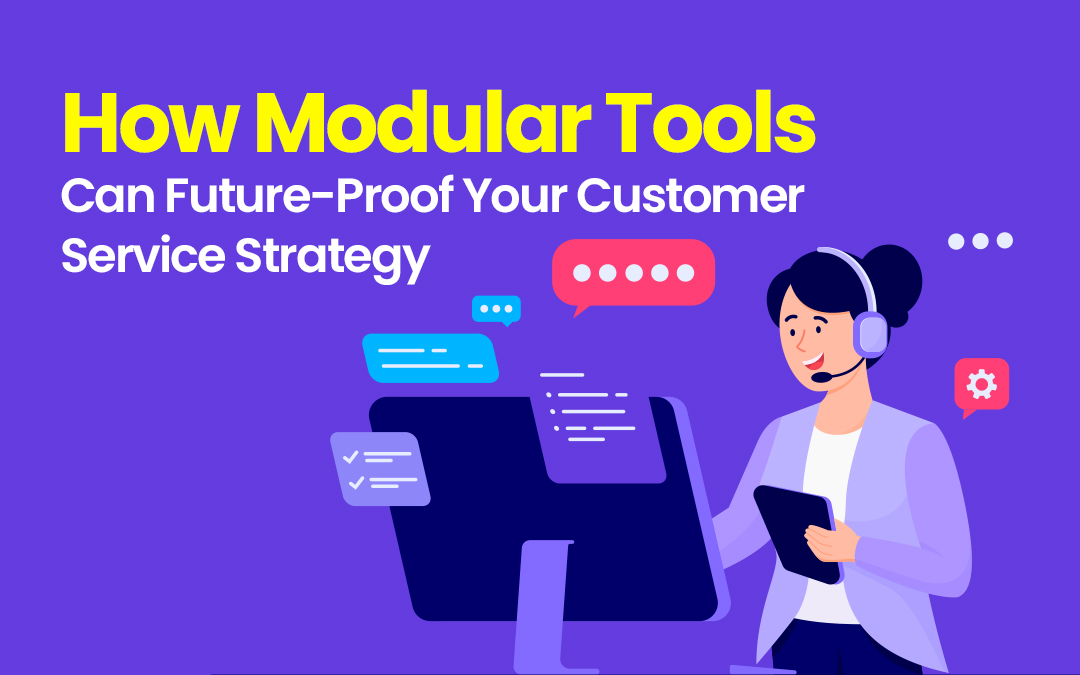
In today’s fast-evolving digital landscape, businesses need to be more agile than ever, especially regarding customer service. Traditional, one-size-fits-all systems sometimes fail to provide the flexibility and adaptability that you need to meet the expectations of customers. In response to these changes, companies turn to modular tools that help them build customized, scalable customer service solutions. Tools like these can help future-proof a business's customer service strategy by offering tailored solutions that grow alongside business needs. To illustrate, Contact Center as a Service (CCaaS) solutions offer businesses the flexibility to adapt their customer service systems by integrating various modular tools, enabling them to stay ahead of customer demands while optimizing their service operations.
So, why is this so important?

Why Modular Tools Are Key to Future-Proofing
Modular tools are technologies that can be selected, integrated, and scaled based on specific business needs. They are designed to be flexible, allowing companies to adopt the required features instead of being locked into a rigid system. With the rise of cloud-based technology, modular tools have become more accessible than ever, helping businesses of all sizes to take advantage of the benefits without heavy investment in infrastructure.
Modular tools allow businesses to respond quickly to shifts in customer behavior, market trends, and technological advancements. Modular tools are adaptable, unlike legacy systems, which can be slow and costly to update. This ability to evolve and scale means businesses can continually optimize their customer service strategy without overhauling their entire system.
Why is this so helpful? Let’s run through some of the benefits.
1. Scalability and Flexibility

As a business grows, its customer service needs will inevitably change. Whether you need to add more agents, integrate new communication channels, or leverage advanced analytics tools, modular systems make scaling seamless.
For example, a small business might start with basic chat and email support but later find the need to add phone support, social media engagement, or even artificial intelligence (AI)-driven chatbots. With modular tools, this growth can happen without causing major disruption to existing systems.
2. Cost Efficiency
Modular tools also offer cost-saving advantages. Traditional customer service systems often come as packages with features businesses might never use. This "all-in-one" approach can be a waste of money, as companies end up paying for functionalities that aren’t necessary for their operations.
In contrast, modular tools allow businesses to pay only for the services they truly need. This creates a more cost-effective solution, particularly for startups and small businesses with limited budgets. If customer demands increase or if the business expands, additional tools can be added without the need for an expensive system overhaul.
3. Improved Customer Experience
In today’s customer-centric world, delivering a personalized and responsive customer experience is crucial. Modular tools allow businesses to create a more tailored service experience, responding precisely to individual customer needs. For instance, if data shows that customers prefer live chat support over email, a company can easily integrate a live chat tool into its existing customer service framework.
This adaptability is especially important in managing omnichannel communication. Customers today expect seamless interactions across various platforms—email, phone, social media, or live chat. A modular approach allows businesses to add new communication channels as customer preferences evolve, ensuring they stay ahead of customer expectations.
4. Enhanced Agent Productivity

Customer service agents are at the frontlines of delivering exceptional customer experiences, and their efficiency is crucial to maintaining a high standard of service. Modular tools can significantly enhance agent productivity by automating repetitive tasks and streamlining workflows.
5. Data-Driven Decision Making
Modular tools often come with built-in analytics capabilities, providing businesses valuable insights into customer behavior, agent performance, and service quality. This data is essential for making informed decisions about customer service strategies and identifying areas for improvement.
For example, if analytics reveal that customer satisfaction dips during specific hours of the day, a business might decide to adjust staffing levels or introduce self-service options during those times. By leveraging real-time data, businesses can continuously optimize their service offerings to better meet customer needs.
6. Future-Proofing with AI and Automation
AI and automation rapidly transform the customer service landscape and businesses that don’t adapt risk being left behind. Modular tools that integrate AI capabilities allow companies to future-proof their customer service strategy by automating routine tasks and providing more personalized service.
For instance, AI-powered chatbots can handle simple queries, freeing up human agents to focus on more complex issues. Natural language processing (NLP) technology can also be integrated to improve communication accuracy, ensuring that customers receive relevant responses in real-time.
This level of automation doesn’t stop at chatbots. Modular tools can automate everything from customer data entry to post-interaction surveys, streamlining workflows and reducing the burden on human agents.
Future-Proof Today

Modular tools offer businesses a flexible, scalable, and cost-effective solution to future-proof their customer service strategy. By integrating modular solutions, companies can respond quickly to changing customer needs, add new communication channels, and leverage data-driven insights to improve the customer experience. As technology evolves, modular tools allow businesses to stay ahead of the curve, delivering personalized, responsive service while optimizing costs and resources.
Wrap Up
In an increasingly competitive marketplace, companies that invest in modular, data-driven customer service solutions will be better positioned to deliver exceptional customer experiences, retain loyal customers, and grow their businesses. By adopting a modular approach, businesses can ensure that their customer service strategies are effective today and ready for the future.
Share this post
Leave a comment
All comments are moderated. Spammy and bot submitted comments are deleted. Please submit the comments that are helpful to others, and we'll approve your comments. A comment that includes outbound link will only be approved if the content is relevant to the topic, and has some value to our readers.

Comments (0)
No comment